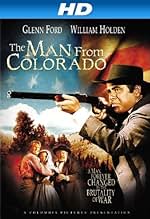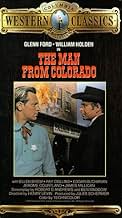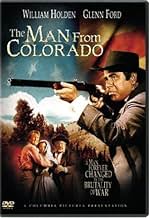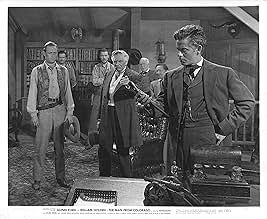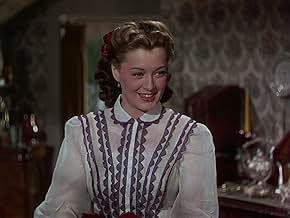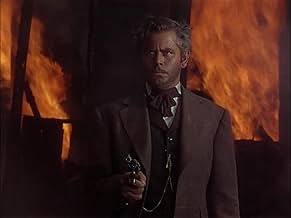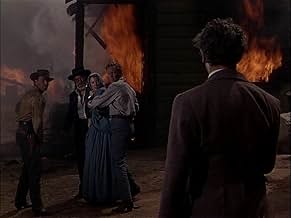IMDb रेटिंग
6.7/10
2.1 हज़ार
आपकी रेटिंग
अपनी भाषा में प्लॉट जोड़ेंAt the end of the Civil War, two friends return home to Colorado and one of them has changed and is violent and erratic.At the end of the Civil War, two friends return home to Colorado and one of them has changed and is violent and erratic.At the end of the Civil War, two friends return home to Colorado and one of them has changed and is violent and erratic.
- पुरस्कार
- कुल 1 नामांकन
William 'Bill' Phillips
- York
- (as Wm. 'Bill' Phillips)
Stanley Andrews
- Roger MacDonald
- (बिना क्रेडिट के)
Emile Avery
- Townsman
- (बिना क्रेडिट के)
Walter Bacon
- Townsman
- (बिना क्रेडिट के)
Walter Baldwin
- Tom Barton
- (बिना क्रेडिट के)
Symona Boniface
- Matron
- (बिना क्रेडिट के)
Chet Brandenburg
- Party Guest
- (बिना क्रेडिट के)
James Bush
- Cpl. Dixon
- (बिना क्रेडिट के)
Nora Bush
- Townswoman
- (बिना क्रेडिट के)
Boyd Cabeen
- Townsman
- (बिना क्रेडिट के)
कहानी
क्या आपको पता है
- ट्रिवियाColumbia Pictures spent quite a bit on The Man in Colorado. At one point, the crew dynamited the side of a 1500-foot mountain in California's San Fernando Valley in order to create a deep gorge as called for by the script. And the western town they constructed was one of the largest location sets ever built by Columbia up to that time. During filming of a massive fire scene at the end, however, the set caught fire uncontrollably, and Holden and Ford tried to actually fight the fire until firemen could arrive. "Dad came away coated in black soot, with burns to his arms and hands," Ford's son Peter later wrote.
- गूफ़Many of the men are wearing trousers with belt loops and belts. Belt loops were not added to men's trousers until the 20th century.
- भाव
Owen Devereaux: [voiceover as he writes in his diary] I killed a hundred men today. I didn't want to. I couldn't help myself. What's wrong with me? I'm afraid... afraid I'm going crazy.
- क्रेज़ी क्रेडिटOpening credits are listed in the pages of a book being turned by a hand.
- कनेक्शनFeatured in Brave Warrior (1952)
- साउंडट्रैकWhen Johnny Comes Marching Home
(uncredited)
Written by Louis Lambert (pseudonym for Patrick Sarsfield Gilmore)
Played at the homecoming
फीचर्ड रिव्यू
The story is a fairly simple one. Col. Glenn Ford and Capt. Bill Holden return with a group of fellow soldiers to their home town after the Civil War has ended. Ford has been a pretty ruthless officer. The town has changed during their three-year absence. Their only source of livelihood were their gold claims, but federal laws converted those claims to private property and the mines were gobbled up by Big Ray Collins.
Collins backs Ford for the post of federal judge, and Ford appoints his best friend Holden as chief lawman. The disappointed ex-soldiers bring their case to Judge Ford who finds in favor of Collins. Judge Ford also marries the girl, Ellen Drew, whom Holden also loves. Well, frankly, the ex-soldiers are thoroughly browned off at the loss of their claims even though Big Ray gives them jobs at a barely livable wage ("digging out our own gold") before firing them. Some of the men become bandits preying on Collins' gold. Some don't. But all of them grow to hate Judge Ford for upholding the law, even coming to his house during a birthday party and insulting him in front of his wife and his guest, the friendly doctor, Ed Buchanan. "I don't blame [Collins]," shouts one of the angry crowd, "I blame you!" Ford throws them out.
The plot gets too complicated to describe in any detail but it can be summed up by saying that Judge Ford slugs Holden for telling him he's "sick inside" (people tell Judge Ford that he's "crazy" so often in this movie that it's no wonder he doesn't believe it). His punishments, while within the law, become outrageous. It isn't so much that he's on the side of Big Ray and the suits. It's that he's on his own trip. The movie ends happily, more or less, with Ford gone and Big Ray destroyed, and Holden riding off to Washington to see that the ex-soldiers and the rest of the town get their just due. He smiles at Allen as he boards the train and tells her, "I'll be back."
It's been pointed out repeatedly that "adult westerns" -- that is, those appearing after everybody started watching cheap Hopalong Cassidy movies on TV -- are a chronicle of their times. {"High Noon" is the most often cited example, although nobody seems quite sure of exactly which point of view the film took.) "The Man from Colorado" is no exception. Released in 1948, it's full of references to war veterans and the problems they experience after returning to their home towns. And Glenn Ford has clearly been twisted by his wartime experiences, as have some character in other late- or post-war movies -- William Bendix in "The Blue Dahlia" or whatever it's called, who keeps hearing "monkey music" in his head, or John Garfield in "Pride of the Marines," or Brian Keith in "Five Against the House," I think it was.
The topical references are the most interesting part of the movie, but they are grafted onto an otherwise routine plot. The movie is overorchestrated. If the characters sang their lines it would be grand opera. The wardrobe is undistinguished. The settings are cheesy. When an unjustly accused young veteran is lying against the wall of his jail cell, it looks like what it is: a plaster wall with bricks painted on it. But Makeup should get a medal. Glenn Ford has worn various dos during his career, from bookeeper to flat-top but nothing like this pompador.
Watch it if nothing else is on.
Collins backs Ford for the post of federal judge, and Ford appoints his best friend Holden as chief lawman. The disappointed ex-soldiers bring their case to Judge Ford who finds in favor of Collins. Judge Ford also marries the girl, Ellen Drew, whom Holden also loves. Well, frankly, the ex-soldiers are thoroughly browned off at the loss of their claims even though Big Ray gives them jobs at a barely livable wage ("digging out our own gold") before firing them. Some of the men become bandits preying on Collins' gold. Some don't. But all of them grow to hate Judge Ford for upholding the law, even coming to his house during a birthday party and insulting him in front of his wife and his guest, the friendly doctor, Ed Buchanan. "I don't blame [Collins]," shouts one of the angry crowd, "I blame you!" Ford throws them out.
The plot gets too complicated to describe in any detail but it can be summed up by saying that Judge Ford slugs Holden for telling him he's "sick inside" (people tell Judge Ford that he's "crazy" so often in this movie that it's no wonder he doesn't believe it). His punishments, while within the law, become outrageous. It isn't so much that he's on the side of Big Ray and the suits. It's that he's on his own trip. The movie ends happily, more or less, with Ford gone and Big Ray destroyed, and Holden riding off to Washington to see that the ex-soldiers and the rest of the town get their just due. He smiles at Allen as he boards the train and tells her, "I'll be back."
It's been pointed out repeatedly that "adult westerns" -- that is, those appearing after everybody started watching cheap Hopalong Cassidy movies on TV -- are a chronicle of their times. {"High Noon" is the most often cited example, although nobody seems quite sure of exactly which point of view the film took.) "The Man from Colorado" is no exception. Released in 1948, it's full of references to war veterans and the problems they experience after returning to their home towns. And Glenn Ford has clearly been twisted by his wartime experiences, as have some character in other late- or post-war movies -- William Bendix in "The Blue Dahlia" or whatever it's called, who keeps hearing "monkey music" in his head, or John Garfield in "Pride of the Marines," or Brian Keith in "Five Against the House," I think it was.
The topical references are the most interesting part of the movie, but they are grafted onto an otherwise routine plot. The movie is overorchestrated. If the characters sang their lines it would be grand opera. The wardrobe is undistinguished. The settings are cheesy. When an unjustly accused young veteran is lying against the wall of his jail cell, it looks like what it is: a plaster wall with bricks painted on it. But Makeup should get a medal. Glenn Ford has worn various dos during his career, from bookeeper to flat-top but nothing like this pompador.
Watch it if nothing else is on.
- rmax304823
- 13 नव॰ 2003
- परमालिंक
टॉप पसंद
रेटिंग देने के लिए साइन-इन करें और वैयक्तिकृत सुझावों के लिए वॉचलिस्ट करें
- How long is The Man from Colorado?Alexa द्वारा संचालित
विवरण
बॉक्स ऑफ़िस
- बजट
- $10,00,000(अनुमानित)
- चलने की अवधि1 घंटा 40 मिनट
- रंग
- पक्ष अनुपात
- 1.37 : 1
इस पेज में योगदान दें
किसी बदलाव का सुझाव दें या अनुपलब्ध कॉन्टेंट जोड़ें



